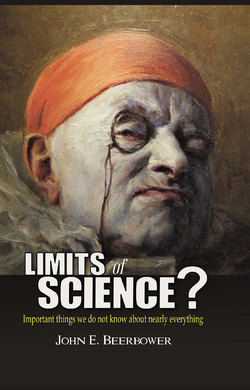Читать книгу Limits of Science? - John E. Beerbower - Страница 14
На сайте Литреса книга снята с продажи.
David Hume
ОглавлениеThe original identification of the problem of induction has traditionally been attributed to David Hume. See, e.g., Ian Hacking, The Emergence of Probability (1975), p.176. Hume’s A Treatise on Human Nature was published in 1739. A more focused (or, at least, more concise) statement of the arguments relevant here was set out in An Enquiry concerning Human Understanding, published in 1748 (originally entitled Philosophical Essays concerning Human Understanding). While Hume may have been the first person to have explicitly identified the problem of induction, Hume himself did not present induction as raising a philosophical problem. For him it was just a fact—one which he used to justify a philosophy of “skepticism.” Hume set the stage for his argument as follows: “Man is a reasonable being; and as such, receives from science his proper food and nourishment: But so narrow are the bounds of human understanding, that little satisfaction can be hoped for in this particular, either from the extent or security of his acquisitions.” Hume, An Enquiry concerning Human Understanding and Other Writings (2007) (edited by Stephen Buckle), p.6.11 He furthered stressed the inherent limits on man’s ability to know and understand the real world. Then, he presented the following thought: “It may, therefore, be subject worthy of curiosity, to inquire what is the nature of the evidence which assures us of any real existence and matter of fact, beyond the present testimony of our senses, or the records of our memory.” Id., p.29.
Hume effectively rejected the applicability of deduction to the external world.12 He expressly distinguished between “relations of ideas” and “matters of fact”, the former including mathematics and logic, subject to intuition and deductive reasoning with the consequent necessity of the conclusions (because contrary conclusions would be logically contradictory and, therefore, inconceivable). In contrast, “[m]atters of fact…are not ascertained in the same manner [through intuition and deductive reasoning]; nor is our evidence of their truth, however great, of a like nature… . The contrary of every matter of fact is still possible; because it never implies a [logical] contradiction… . Were it demonstratively false, it would imply a contradiction, and could never be distinctly conceived by the mind.” Id., pp.28–29; see also, id., p.36.
Hume argued that everything that man knew was a result of sensory perceptions combined with the search for patterns or “associations” of events and facts. The most important (or only) such association for matters of fact was “cause and effect.” Id., pp.20–21. (“All reasonings concerning matters of fact seem to be founded on the relation of cause and effect. By means of that relation alone we can go beyond the evidence of our memory and senses.” Id., p.29).
In other words, man continually scans the available sensory inputs and attempts to identify relationships of cause and effect. Such activity was essential to man’s survival, but was also the heart of scientific knowledge. Hume believed that induction was inherent and essential—there is no alternative available. He recognized the circularity involved in efforts to justify inductive reasoning. (“It is impossible, therefore, that any arguments from experience can prove this resemblance of the past to the future, since all these arguments are founded on the supposition of that resemblance.” Id., p.38.)
Hume also highlighted the distinction between practical conduct and philosophical inquiry. “My practice, you say, refutes my doubts. But you mistake the purport of my question. As an agent, I am quite satisfied in the point; but as a philosopher, who has some share of curiosity, I will not say skepticism, I want to learn the foundation of this inference.”13 Subsequent philosophical inquiries have focused on the alleged logical shortcomings of induction or solving the “problem” of induction.
